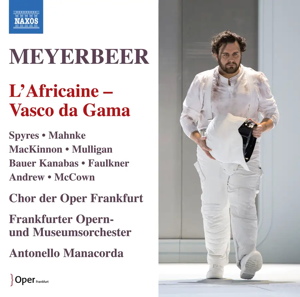
Giacomo Meyerbeer (1791-1864)
L’Africaine (Vasco da Gama) (1865)
Michael Spyres (Vasco da Gama), Claudia Mahnke (Sélika), Brian Mulligan (Nélusko), Kirsten
MacKinnon (Inès), Andreas Bauer Kanabas (Don Pédro), Thomas Faulkner (Don Diego), Bianca Andrew (Anna), Michael McCown (Don Alvar)
Chor der Oper Frankfurt, Frankfurter Opern- und Museumsorchester/Antonello Manacorda
rec. live March, April 2018, Oper Frankfurt, Germany
No libretto
Naxos 8.660558-60 [3 CDs: 201]
Meyerbeer’s posthumously performed opera L’Africaine contains some lovely music but it suffers from an uneven musical and dramatic cohesion. The first two acts contain a few memorable numbers, but in general most performances of this opera don’t really come to life until the opening of third act, when Vasco’s expedition is lost at sea. There is a marked increase in excitement in the music which for the most part is maintained for the duration of the opera. Certainly this new recording from Naxos continues that impression upon first hearing.
This recording derives from a series of live performances which occurred in Frankfurt back in 2018. Unusually for Naxos, they have included a few photos of the production throughout the booklet, which is otherwise the usual sparse product that we have come to expect from this label. Those photos show a production that is set in outer space. Think of Star Trek, or 2001: A Space Odyssey and you will get the idea. I suppose the strong colonialist aspect of this opera caused the director to search for another approach to make it more relevant in modern terms. I can see the idea working quite well if the stage sets where sufficiently opulent enough in a Star Wars kind of design esthetic. Looking through the available photos, that doesn’t appear to be the case for the Frankfurt production.
The opera is presented in the new critical edition from the House of Ricordi. I believe this to be its first recording. Despite the presence of numerous passages in the score that I hadn’t encountered before there still seem to be some cuts in the music; one example is the offstage chorus for Inès and the Portuguese women who are being led off to their demise. It is not Meyerbeer’s most sterling music but it features a crucial plot point for the next Act which gets lost when that music is removed. One can only hear it on the cpo recording (review), or on an old live recording under Riccardo Muti on the Opera D’oro label.
The cast assembled here is quite successful for the most part. Claudia Mahnke’s Sélika is a really lovely performance. Mahnke has a soft velvety mezzo with a slightly grainy quality to her tone. She sings the final death scene most movingly. She lacks power in her uppermost register and tends to eschew high notes more often than not. Sélika is really a role for a soprano with a strong lower range. Rosa Ponselle was once a leading exponent of the role. There are two previous recordings which feature Shirley Verrett which show that even she struggled with the high tessitura of the role at times. One of the most successful Sélika’s was the young Jessye Norman on the live Florence recording (under Muti). Alas, that one is in Italian only so it is not a top choice to hear this opera.
Up and coming soprano, Kirsten MacKinnon gives a poised and moving account of Inès. Her tone is gleaming although occasionally a touch of hardness creeps in whenever ascends into the stratosphere. She makes her presence felt as a dramatic rival for the love of Vasco da Gama.
Brian Mulligan gives a powerhouse performance here as the conflicted Nélusko. His burnished tone is strong and forthright: He also sings with the most dramatic presence of the entire cast. If he keeps up this high level of singing he will be one of today’s most admired artists.
The only real disappointment here is Michael Spyres’ depiction of the heroic tenor role of Vasco da Gama. While he sings cleanly, and with a clear, attractive sound, His voice sounds a size too small for the role. His voice does not register well in the sound stage of the recording, which is odd because all of the soloists were given body mikes, making them generally sound as if they are all front and center to the listener. Spyres sounds hampered here. It is clear that the role is really intended for a tenor with a beefier sound than Spyres possesses. Plácido Domingo can be heard singing Vasco on CD and DVD (review); in both cases his larger, more dramatic sound leave a better impression overall. To be fair to Spyres though, he attempts more vocal characterization than Domingo, who is content just to sing out powerfully.
The smaller roles are taken quite ably by the Frankfurt ensemble and in the case of Andreas Bauer Kanabas’ Don Pedro an important sense of power and presence is noted.
Antonello Manacorda conducing allows the score to chug along. He is not able to make much of an impression in the musically uneven inspiration of the first two acts; however, once the third act is reached he really digs into the colour and liveliness of the score and mostly comes up trumps. The orchestra and chorus are of the usual high standard from the Frankfurt ensemble. The sound engineering is also quite the equal of the excellent standards set by the Oehms label in their series of opera recordings made at this admirable venue. Apart from the misgivings I have about Michael Spyres, I find this an laudable set all around. It is doubtful that there will be anything that comes along to improve on the experience that Naxos and Frankfurt have provided. Meyerbeer it seems is going through a mini resurgence at the present. Any chance to reassess his work is worth the time involved.
Mike Parr
Buying this recording via a link below generates revenue for MWI, which helps the site remain free.



















